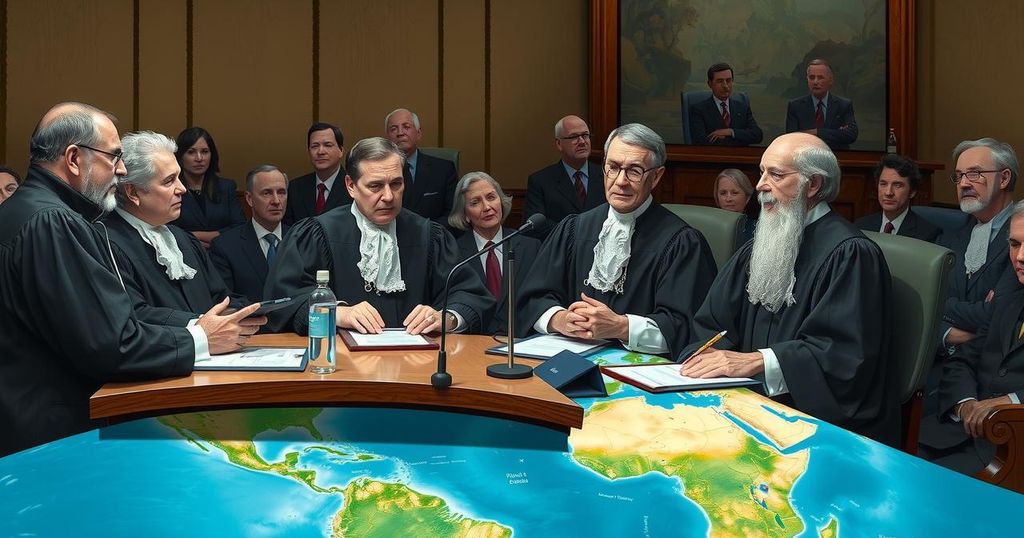The ICJ is holding hearings on climate change obligations, requested by the UNGA, to establish state liabilities and necessary actions. With four judges posing follow-up questions to participating countries, responses are due by December 20, 2023. The advisory opinion, although non-binding, may guide future climate legislation and litigation, with a final release expected around mid-2025.
From December 2 to December 13, 2023, the International Court of Justice (ICJ) conducted oral hearings regarding its Advisory Opinion on the obligations of states in relation to climate change, at the request of the United Nations General Assembly (UNGA). The ICJ will assess the legal liability of nations contributing to climate change and the actions required to mitigate it. Following the hearings, judges submitted queries to the participating states, with responses due by December 20, 2023.
Established in 1945, the ICJ, often referred to as the World Court, serves as a legal forum for resolving disputes between nations under the UN Charter. The Court is situated in The Hague, Netherlands, alongside other significant international legal bodies. The ICJ’s structure comprises 15 judges elected to serve nine-year terms, and at present, its leadership includes Judge Nawaf Salam of Lebanon as President. The panel features judges from various countries, including Australia, Brazil, China, and more.
The UNGA’s request for an advisory opinion stemmed from Vanuatu’s initiative, seeking clarity on the obligations of nations to combat climate change. The advisory opinion, albeit non-binding, is anticipated to influence future climate-related litigation and legislative measures. The main inquiries posed to the ICJ concern the international obligations of states to protect the climate and the legal implications for states causing significant climate harm, especially for vulnerable nations such as small island developing states.
During the hearing, representatives from over 100 countries engaged in detailed discussions concerning the United Nations Framework Convention on Climate Change and the Paris Agreement. While significant nations like the United States and Australia asserted that these agreements provide a comprehensive legal framework, developing countries countered this perspective by asserting that the impacts of climate change violate international human rights and warrant reparations.
At the hearings’ conclusion, four judges delivered specific questions to the parties involved, seeking further clarification on key points raised. Examples of inquiries included the obligations regarding fossil fuel production under international law, the interpretation of obligations under the Paris Agreement, the notion of a legal right to a clean environment, and the implications of states’ declarations upon joining the UNFCCC and Paris Agreement for liability perspectives.
While a timeline for the final advisory opinion remains unclear, the complexity of the issues discussed suggests it may be released in mid to late 2025. This opinion is expected to significantly shape the international response to climate change and the legal frameworks governing state responsibilities.
The International Court of Justice (ICJ) plays a pivotal role in adjudicating disputes between nations and providing advisory opinions on legal matters referred by UN bodies. Its recent deliberations pertain to the critical issue of climate change, with nations increasingly scrutinized for their contributions to this global challenge. The ICJ’s process involves careful consideration of international treaties and human rights frameworks, especially concerning how states may be held liable for climate-related harm. The ongoing discussions underscore the urgent need to address the legal and moral responsibilities of countries in an era of escalating climate crises.
The ICJ’s ongoing hearings regarding nations’ obligations toward climate change highlight a significant moment in international law. As nations present their arguments, the final advisory opinion will shed light on the responsibilities of states in mitigating climate change and the potential for legal remedies for those adversely affected. Such developments may lead to groundbreaking changes in climate litigation and policy, influencing both domestic and international legal frameworks.
Original Source: www.forbes.com






